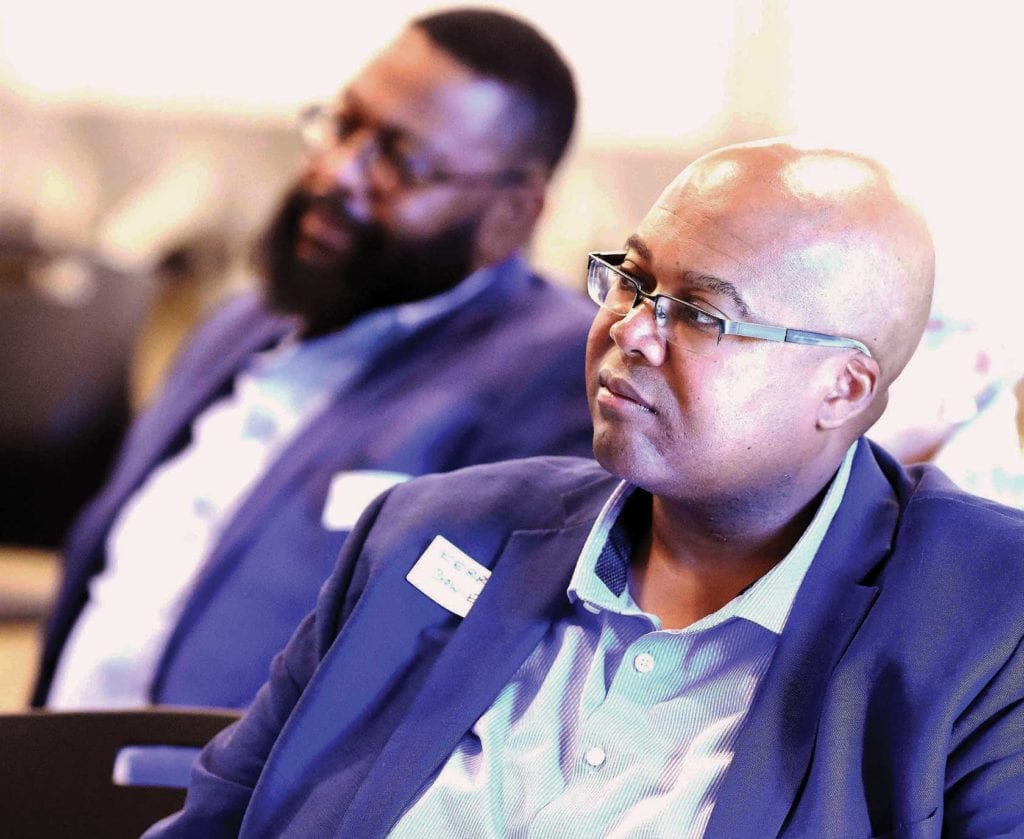
The consulting firm Msaada Partners was founded to help foster growth in small businesses, entrepreneurs and nonprofits working in underserved communities. Managing Partner Kerry Bowie and partners Maribel Mendoza and Chris Johns — all of whom earned degrees from MIT — each have had experiences with start-up ventures.
Bowie mentors start-up firms as part of the MIT Venture Mentoring Service and serves on the board of the Boston Ujima Project Investment Committee. Mendoza co-founded Momolution and Kidstarters, ventures that focus on mothers returning to the workforce and kids becoming entrepreneurs. She has worked in product development in education technology, health care and human resources companies. Johns is a co-founder of Boston-based ThoughtCraft Architects has done independent pro bono work with SkyLab Boston.
Msaada, Swahili for “service,” employs what Bowie calls a “capital plus” approach, assisting clients through providing access to human capital, intellectual capital, social capital and financial capital. The partners leverage their own intellectual and social resources to help ventures grow. While Msaada does not yet have its own pool of financial capital, the partners have connections to people and institutions who provide debt, equity and/or hybrid financing options.
The following interview with Bowie has been edited for brevity.
What made you decide to start Msaada Partners?
Bowie: In a sense it was “Snowmageddon” back in 2015. I was approaching my eighth year of working for the Commonwealth of Massachusetts. I was an associate commissioner at the Massachusetts Department of Environmental Protection working on brownfields, environmental justice and food policy. All three of those areas had stalled due to different issues — funding, staffing and scoping. The feud between Governor Charlie Baker and then-MBTA General Manager Beverly Scott had sucked the oxygen away from almost everything else, so I had some time on my hands to think about next steps. In traveling around the state to discuss environmental justice issues, I quickly realized that while mitigating climate change by reducing greenhouse gases or adapting to it through preparedness efforts was important to communities, it was not the most important issue.
[More important were] jobs, education, housing, transportation, food insecurity and public safety, to name a few. As a person of color, a black man, I got it. As a public servant and environmental official, I did not think that jobs, for instance, and climate change action were mutually exclusive. I actually thought that it was terrible that communities were bearing the brunt of the “environmental bads” while missing out on the “environmental goods,” such as green and cleantech jobs in energy efficiency, renewable energy, water and open spaces.
In parallel, I had been mentoring for the MIT Venture Mentoring Service (VMS) for four or five years by then and had recognized that I was not mentoring people who looked like me. They were typically white or Asian MIT students, and mostly men. One of those white guys was Gilad Rosenzweig, who started Smarter in the City, a high tech accelerator in Dudley Square. I was recruited to join Gilad’s mentor team and help him to better understand white privilege and some of the pushback he was getting from some members of the community. I also was able to meet entrepreneurs like Mojossorica “Rica” Elysee and Melissa James of BeautyLynk and Tech Connection, respectively. Rica and Melissa are both young black women with great ideas for companies that they have grown since then; however, I could see the stark difference in the level of resources — time, talent and treasure — that these young black women in Dudley Square were receiving, vs. the young white men in Kendall Square.
I incorporated Msaada Partners in June of 2015 and on Leap Year Day 2016 (i.e., February 29), took the leap of faith and started full-time on Msaada Partners.
What unique skills and perspectives do you and your partners bring to the startup world?
We are competent in the startup space; we are taking a commercial approach; and we genuinely care about the communities we serve. None of these items is unique in and of themselves, but it is somewhat unique to have them all together. In terms of competency for example, in addition to serving as a mentor for MIT’s Venture Mentoring Service (VMS) for the last nine years, I am also an adjunct instructor for the National Science Foundation’s Innovation Corps Program. Thus, I am accustomed to working with early-stage startups on how to achieve product market fit, develop their go-to market strategies, and sustain and grow their operations. While a number of our clients are nonprofit organizations, our primary focus is on growth-focused entrepreneurs, startups and small businesses.
Lastly, we care about the communities. So while we do not begrudge and even welcome more donor dollars coming into nonprofits in the community, we really want to see more investor dollars going to the businesses in the community. We are “committed” to the communities in much the same way a pig is committed to a plate of ham and eggs. There are a lot of organizations that are more “involved,” like a chicken is with the eggs.
What do you see as the greatest challenges facing entrepreneurs in communities of color?
What we’ve heard is that entrepreneurs of color need technical assistance that fits, access to capital, and space to collaborate and convene — especially in Roxbury, Dorchester, and Mattapan. We think that entrepreneurs need the consulting, coaching and connections that we aim to provide.
What are some key strategies you employ to help new companies grow?
Generally, listening to the voice of the customer is the key strategy or tactic for helping companies grow. The biggest reason that most enterprises fail is because they provide something that nobody really wants. Helping clients to get out of the way and listen to and digest what their customers are telling them is a key strategy that we employ. This allows the company to really home in on who their customer truly is and what value, if any, they are truly providing. This is the essence of product market fit and the building block for everything else.
More specifically, we select a half-dozen companies for our Majira Project that matches post-accelerator companies led by founders of color and/or targeting underserved communities with pro bono consultants from The Boston Consulting Group (BCG) who work on a strategy, sales and marketing, or operations project. Msaada Partners provides business coaching and mentoring in series and in parallel with the approximately 16-week BCG engagement.
What qualities do you think are necessary for an entrepreneur to be successful in today’s economy?
Grit, humility, and passion. Paraphrasing Ecclesiastes 9:11, the race is neither won by the swift nor the strong but they who endureth to the end. This entrepreneurship thing is not a sprint, a steeplechase, or a marathon — it is all of the above. It is not for the faint of heart, so you need to be ready to deal with the ups and downs, long nights and all that goes with making your business successful. Grit requires patience and strength. You also need humility to be able to be able to recognize your limitations and seek out help when you need it. Lastly, you have to have passion for the problem that you are trying to solve — otherwise, there is no fuel for the grit, no compelling reason for you to humble yourself and ask for help.
What do you enjoy most about working with entrepreneurs?
My passion is efficiency. Working in the energy and environmental space was a great place to put this passion to work, as we do so many things in an inefficient way in terms of wasted resources. However, the entrepreneurship and innovation space is a great place too, as we are currently wasting resources there. There are companies that are not being formed because of the lack of capital coming into our communities, due to both conscious and unconscious biases past and present. Being able to match entrepreneurs with the appropriate resources and see them grow their businesses, hire employees and create wealth is why we do the work that we do.







